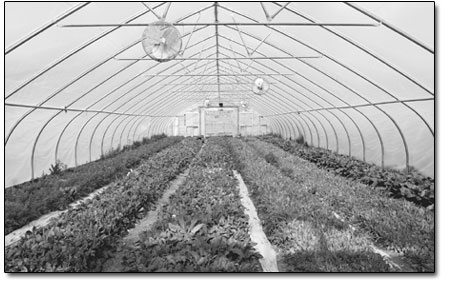| ||
Growing toward sustainability
by Jeff Mannix Sustainability has become a word that communities around the world have punched up to the top of their concerns now demanding life or death attention. La Plata County is no exception. Lightening footprints and improving quality of life are becoming major goals for local residents, and much of that work is beginning at the dinner table. Most foodstuffs throughout the world and in local markets are produced offshore at the lowest cost of materials and labor and designed to appeal to convenience. Unrestrained consumerism and immediate gratification are taking heavy tolls, however. Americans are consuming or otherwise ravaging the proverbial goose, as the egg becomes more brilliant but less nutritious. In addition, corporate America is often manufacturing a synthetic concoction that used to be called food back before agricorps forced the small farmer out of business. Jim Dyer is the coordinator of the Farm to School Program and Project Director of the Southwest Marketing Network. Both these local non-profits are increasingly bringing the products of local artisan food growers to the attention of a health-conscious community. “We have a cheap food policy in this country,” Dyer says. “We need to realize that our food, real food grown ethically in its season and by our neighbors, costs more than the factory food sold by the ton and shipped immature from thousands of miles away, even from across the globe.” This cheap food policy is driven by the subsidies doled out by the federal Farm Bill, Dyer adds. The Farm Bill is currently being revised in Washington, D.C. for the next five years, and giant publicly-owned corporations will again be the beneficiaries. “The Farm Bill should be called the Food Bill,” according to Tom Riesing, co-owner of Oakhaven Permaculture Center in Hesperus, an experimental farm exploring new technology for low-input food and fuel crops. “Food production has been colonized by corporate America and we must re-localize it as the very basic tenant of sustainability for our communities,” he continues. “It is not unrealistic to foresee a time fast approaching when transportation and fossil fuel costs – to say nothing of natural or man-made disasters – will cut off towns and cities from the supply line. We saw a glimpse of this last winter when the big snowstorms in Denver almost emptied our local grocery stores in three days.” Local food production is the answer to these threats, agree Riesing, Dyer and others. “It’s the right thing to do,” says Tom Buscaglia, of R.A.S Farms. “This (local food) is the future. We’re going back to the future, and right now it looks like it’s the only way to survive.” Buscaglia insists that sustainability follows a feeling of connection - to the earth, community and family. He adds that it used to be that way in rural communities, and the trend is moving that way again. Consumers in Durango and throughout the country are accelerating that pace by embracing locally grown food and having relationships with the growers themselves. “Knowing where our food is coming from, and trusting the growers, is very important to us,” says Durango Farmer’s Market shopper Dale Lawson, “and of course the wonderful flavor of locally grown produce, fruit and meat is so superior that it justifies setting aside a little more of our household budget for food.” Dale’s wife, Kirsten Lawson, adds, “And we have so much fun at the Farmer’s Market, visiting with all the friends we’ve made there and knowing that we all share the same interest in keeping ourselves and our community healthy.” All you have to do is visit the growers’ booths at the Farmer’s Market to realize that all the vendors are proud of their production and proud to put their names on their harvest. The concept is old fashioned, by a 21st century yardstick, but it is indeed the future, as evidenced by growth in the international Slow Food movement and a 100 percent increase in farmer’s markets in the last few years. In addition, locally grown organic food is presenting a greater threat to agricorps, who themselves are cutting every corner to come out with organic labels. According to the Sustainability Alliance of Southwest Colorado, La Plata County has more food-buying clout than seems apparent. Local consumers spend more than $100 million annually on food. Ten percent of that, or $16,000,000, is spent on locally grown produce and meats from approximately 100 independent family farms and ranches. According to Jim Dyer and Dan James, president of the Durango Farmer’s Market, direct marketing of locally grown food is so In demand that the call is out for more growers and more product. “A healthy local food system is made up of consumers and citizens who value local agriculture for all that it offers, including open space, aesthetic landscapes, wildlife habitat, and local food and fiber – and are willing to support it,” Dyer says. And toward that goal, and the hope for more growers, Dyer and other leaders in local sustainability have organized what they call “Land Link,” where landowners are being encouraged to lend a plot of land to entry-level farmers to cultivate the soil to grow produce that can fill in the demand. Durango and its surroundings have long been admired by visitors from around the world for its resources, both land and people. The region now holds claim to another accomplishment – local consumers and growers have become leaders in identifying and working to solve the sustainability challenges every community in the world is facing. •
|
In this week's issue...
- May 15, 2025
- End of the trail
Despite tariff pause, Colorado bike company can’t hang on through supply chain chaos
- May 8, 2025
- Shared pain
Dismal trend highlights need to cut usage in Upper Basin, too
- April 24, 2025
- A tale of two bills
Nuclear gets all the hype, but optimizing infrastructure will have bigger impact


